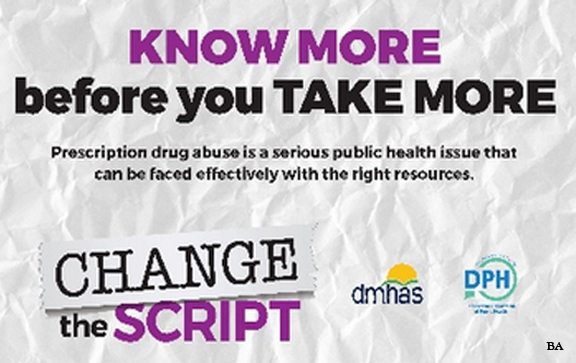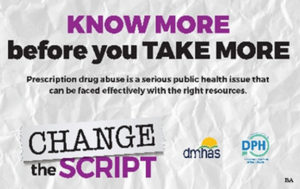
Report by Paula Antolini
March 11, 2018 2:25PM EDT
Gov. Malloy Announces Launch of Connecticut’s ‘Change the Script’ Campaign to Combat the Prescription Drug and Opioid Misuse Crisis
Public Awareness Campaign Part of Governor’s CORE Initiative
(HARTFORD, CT) – Governor Dannel P. Malloy today joined the Commissioners of the state Departments of Mental Health and Addiction Services (DMHAS), Consumer Protection (DCP) and Public Health (DPH) to officially launch the Change the Script statewide public awareness campaign, which is designed to provide communities, healthcare providers, pharmacists, and individuals with information on the prescription drug and opioid misuse and overdose crisis that is plaguing states throughout the nation.
This multi-pronged, multi-agency marketing and education campaign grew out of the Governor’s Connecticut Opioid REsponse (CORE) Initiative, a three-year strategy to prevent addiction and overdoses.
“Opioid addiction and prescription drug misuse is a disease that is impacting nearly every community and people of every background,” Governor Malloy said. “It is a complex crisis that does not have one root cause, nor does it have simple solution, but we need to do everything in our power to treat and prevent it. Our work on this front will not be finished until our communities and our families are no longer struggling with the grave costs of this illness.”
“I applaud Governor Malloy and our state agencies for their ongoing efforts to curb opioid addiction and overdose,” Lt. Governor Wyman said. “Education is a critical tool for avoiding addiction, but for those caught in the epidemic, it’s important to know how to get help.”
Ready-to-use Change the Script campaign materials are being distributed by the state to local health departments, local prevention councils, healthcare providers, pharmacists, and other community partners and stakeholders with information on three main topics: prevention, treatment, and recovery. These materials are intended to raise awareness of the risk of addiction to prescription opioids; highlight the proven methods of treating opioid use disorder (i.e. opioid addiction); and highlight resources in the community to help people establish and sustain lifelong recovery.
Change the Script was chosen as the theme of the campaign to speak to the need to change public perception and thinking about opioid use disorder and acknowledge it as a chronic disease. The campaign seeks to address the stigma and shame associated with the disorder, which often prevents a person or their loved ones from seeking help. Change the Script also focuses on the overprescribing of opioids occurring not just in Connecticut, but nationwide, and the need for proper storage and disposal of these drugs by consumers.
“The opioid crisis is one that has touched the lives of nearly every person in our state,” DMHAS Commissioner Miriam Delphin-Rittmon said. “It’s important that our residents are aware of the extent of prescription drug misuse and opioid use disorders. This campaign will raise awareness for residents regarding the misuse of opioids and help communities to mobilize to Change the Script.”
“We are hopeful that seeing these materials widely available throughout the state will encourage a larger dialogue between patients and prescribers when addressing pain management, along with what to do if misuse has occurred and a person needs assistance,” DPH Commissioner Dr. Raul Pino said.
“The opioid crisis has affected far too many families in our state, and we know there’s no one solution,” DCP Commissioner Michelle H. Seagull said. “We hope that the educational information provided through Change the Script can help families and prescribers take steps towards a healthier future as we combat this crisis together.”
In addition to the educational materials being distributed by the state, Change the Script messages will soon be seen on billboards and busses throughout the state. The campaign will include television, radio, print, and online ads, as well as posters, brochures, and other printed materials.
Funding for the campaign was provided through grants from the U.S. Department of Health and Human Services that were sought collaboratively by DPH, DMHAS, and DCP.
For more information about the campaign, visit www.drugfreect.org.
###


Leave a Reply